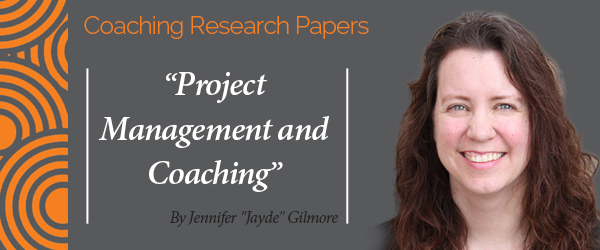A Research Paper created by Jennifer “Jayde” Gilmore
(Career/Spiritual Coaching, UNITED STATES)
Project Management and Coaching
When considering a career change, it is common to evaluate transferable skills so that one can leverage existing strengths in one’s new role. However, when an industry is in its early stages the pioneers may not always consider methodologies developed for established industries. In a cursory overview of project management and coaching one may not notice any obvious similarities. Project Management is tightly focused on meeting particular corporate financial or other goals, while Coaching is a supportive, individually focused tool for personal development. This document will provide a comparison of the two disciplines, and show how the established methodologies of project management can provide a tool for coaches working with corporate and non corporate clients.
Project Management
Project Management can be defined as “… the planning, organizing, directing, and controlling of … resources for a [project].” A project is “.. a temporary endeavor undertaken to create a unique product, service, or result”
Project management evolved from practices implemented by the U.S. Department of Defense and their contractors to ensure repeatability and consistency. It has gained popularity and credibility among businesses and other organizations as more executives and managers have recognized the value and cost savings in successful projects and repeatable outcomes.
The client in project management is, ultimately, the business or organization utilizing the project manager. The project manager works with various executives and employees to determine the scope, or goal, of the project, along with any requirements and budgets, and works with developers, engineers, and manufacturers to guide the creation and production of any products, documentation or other milestones. An executive stakeholder provides the decision making and final authority when needed for approvals, and conflict resolution. Ultimately, the organization benefits from cost savings or increased revenue.
The Project Management Institute ) has formalized project management and offers a widely accepted certification for project managers. They break project management into 47 processes, grouped into five process groups – Initiating, Planning, Executing, Monitoring & Controlling, and Closing.
The Initiation process group occurs first and includes processes that help define the project itself – who will be involved, what costs are expected, and of course, what is the actual project. It is important to be as specific as possible in this phase to ensure that the project is manageable and will return the expected results.
The next process group, Planning, includes process that specify the exact tasks, actions, documentation, and products that will be expected from the project. Again, specificity is important, and requirements are often created to as minuscule a level as possible to allow for accurate estimation of costs and task duration.
The next two process groups, Executing and Controlling & Monitoring, usually happen at the same time. It is here that the tasks identified in the Planning phase are performed, the documentation and products are produced. At the same time, the project manager and any supervisors involved will monitor the activities of the developers, engineers, and manufacturers to ensure that they are performing the tasks identified and that deadlines and budgets are being met. In the case of a project that is having problems, corrective action may be taken. The project will stay in these process groups until the final task is complete.
The final process group, Closing, involves bookkeeping and archival tasks, as well as reviews of what was accomplished, any problems along the way and how they were dealt with, and things that went especially well. This information is usually preserved for future projects. In some cases, the closing process group will also identify requirements and definitions for another project.
